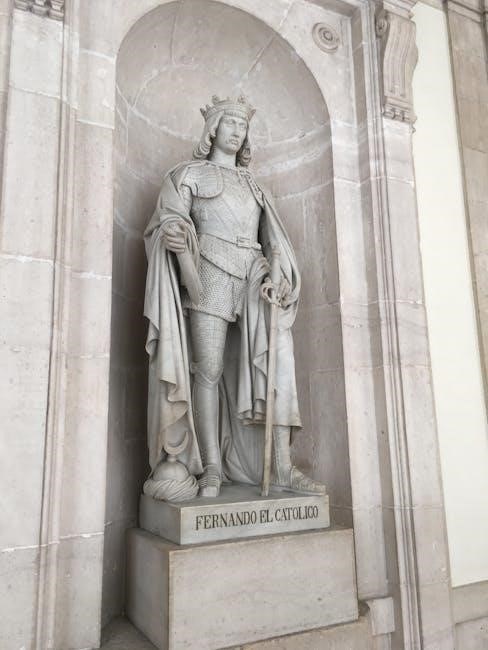The Examen de Conciencia is a spiritual practice in Catholicism‚ guiding individuals to reflect on their actions and relationship with God‚ others‚ and themselves. It involves prayer‚ sincerity‚ and self-awareness‚ helping believers prepare for confession and foster spiritual growth through honest reflection on their sins and virtues. This method‚ often using the Ten Commandments or Pope Francis’s 30 questions‚ encourages Catholics to deepen their faith and seek reconciliation with God and others.
1.1 Definition and Purpose
The Examen de Conciencia is a Catholic spiritual practice of systematic self-examination‚ helping individuals reflect on their actions‚ thoughts‚ and omissions. Its purpose is to prepare for confession by identifying sins‚ fostering spiritual growth‚ and deepening one’s relationship with God. Through prayer and reflection‚ it guides believers to acknowledge their faults‚ seek forgiveness‚ and live according to Catholic teachings‚ promoting sincerity and reconciliation.
1.2 Importance in Catholic Spirituality
The Examen de Conciencia holds a vital role in Catholic spirituality‚ fostering self-awareness‚ accountability‚ and humility. Rooted in tradition‚ it prepares believers for confession and spiritual growth‚ encouraging recognition of sins and virtues. By reflecting on their actions‚ Catholics deepen their relationship with God‚ align their lives with Church teachings‚ and cultivate a conscience guided by faith. Regular practice enhances prayer‚ sacramental participation‚ and overall moral development‚ enriching their journey toward holiness and divine reconciliation.
The Concept of Examen de Conciencia
The Examen de Conciencia is a Catholic spiritual practice emphasizing self-reflection‚ prayer‚ and conscience examination to deepen one’s relationship with God and foster personal spiritual growth daily.
2.1 Historical Background
The Examen de Conciencia has roots in Catholic tradition‚ tracing back to early spiritual practices. St. Ignatius of Loyola popularized it in the 16th century‚ emphasizing daily reflection. Over centuries‚ it evolved into a key practice for examining sins‚ seeking forgiveness‚ and aligning one’s life with God’s will. This method remains integral to Catholic spirituality‚ fostering self-awareness and moral growth‚ as highlighted in various Church teachings and documents.
2.2 Theological Foundations
The Examen de Conciencia is grounded in Catholic theology‚ emphasizing sin‚ mercy‚ and reconciliation. Rooted in the Ten Commandments‚ it reflects the Church’s teachings on moral law and the need for contrition. This practice aligns with the sacrament of Reconciliation‚ highlighting God’s forgiveness and the call to holiness. By examining conscience‚ believers acknowledge their sins‚ seek pardon‚ and strive to live according to divine will‚ guided by the Holy Spirit’s illumination of their moral state.

Structure of the Examen de Conciencia
The Examen de Conciencia involves prayer‚ reflection on actions‚ and examination of sins. It includes steps like expressing sorrow‚ resolving to improve‚ and closing with prayer for guidance.
3.1 Steps Involved in the Process
The Examen de Conciencia begins with prayer‚ seeking God’s guidance. It involves reflecting on actions‚ identifying sins‚ and expressing sorrow. Key steps include acknowledging faults‚ resolving to improve‚ and closing with prayer for strength. This structured approach helps individuals deepen their spiritual awareness and prepare for confession‚ fostering a sincere commitment to moral growth and reconciliation with God.
3.2 The Role of the Ten Commandments
The Ten Commandments serve as a moral framework for the Examen de Conciencia‚ guiding individuals to reflect on their actions‚ thoughts‚ and omissions. By examining their lives against these divine laws‚ believers identify sins and areas for improvement. This structured approach ensures a comprehensive evaluation of conscience‚ fostering accountability and spiritual growth while preparing for confession and reconciliation with God and others.

Pope Francis’s 30 Questions for Self-Examination
Pope Francis’s 30 questions guide Catholics in reflecting on their relationship with God‚ others‚ and themselves‚ fostering honesty and spiritual growth. These questions help identify sins and virtues‚ aiding in confession preparation and deeper faith commitment.
4.1 Questions Related to God
Pope Francis’s questions related to God focus on devotion and sincerity. They include: “Do I only turn to God in times of need?” and “Do I regularly attend Sunday Mass and holy days?” These inquiries encourage reflection on prayer habits‚ such as starting and ending the day with prayer‚ and whether one feels ashamed to publicly express their Catholic faith. They aim to deepen the relationship with God and inspire authentic spiritual growth and commitment.
4.2 Questions Related to Neighbor and Self
Pope Francis’s questions about neighbor and self highlight virtues like generosity‚ humility‚ and kindness. They include inquiries about serving others‚ speaking ill of them‚ or causing harm. These questions also focus on self-reflection‚ such as spiritual growth‚ patience‚ and avoiding gossip. They aim to inspire a deeper sense of responsibility and compassion‚ encouraging individuals to examine their actions and attitudes toward others and themselves‚ fostering personal and relational holiness.

Preparing for Confession Through Examen
The examen de conciencia prepares Catholics for confession by reflecting on sins‚ seeking forgiveness‚ and resolving to change through prayer and sincere self-examination. It guides individuals to recognize their faults‚ foster spiritual growth‚ and deepen their relationship with God‚ emphasizing honesty and commitment to personal improvement.
5.1 Practical Steps for Effective Preparation
Begin with prayer‚ asking the Holy Spirit for guidance. Reflect on sins against God‚ others‚ and yourself‚ using the Ten Commandments or Pope Francis’s 30 questions as a guide. Be honest and specific in identifying faults. Seek forgiveness through sincere reconciliation and resolve to amend your life. Conclude with prayer‚ asking for strength to avoid sin and grow in holiness‚ ensuring a meaningful confession and spiritual renewal.
5.2 Spiritual Reflection and Sincerity
Spiritual reflection involves a heartfelt examination of conscience‚ fostering honesty and self-awareness. It requires acknowledging sins with humility and seeking forgiveness. Sincerity is essential‚ ensuring that the examination is not superficial but rooted in a genuine desire to grow closer to God. Prayer guides this process‚ helping to discern motivations and actions. Through this‚ Catholics cultivate contrition and a deeper commitment to living according to God’s will‚ preparing for meaningful reconciliation.

Common Mistakes to Avoid During Examen
Common mistakes include overlooking venial sins‚ being insincere‚ or rushing through the process. It’s important to approach the examen with honesty and thoroughness‚ avoiding superficiality.
6.1 Overlooking Venial Sins
Overlooking venial sins is a common mistake during the examen. These lesser sins‚ while not mortal‚ can still hinder spiritual growth and weaken one’s relationship with God. Failing to acknowledge them prevents genuine repentance and reconciliation. It’s essential to approach the examen with honesty‚ recognizing even minor faults‚ to foster true conversion and deepen one’s commitment to living virtuously.
6.2 Lack of Sincerity and Depth
A common mistake during the examen is approaching it without genuine sincerity or depth. Superficial reflection fails to uncover true spiritual struggles‚ hindering personal growth. Lack of honesty with oneself and God prevents authentic reconciliation. It’s crucial to engage with humility and openness‚ allowing the Holy Spirit to illuminate areas needing improvement. Without sincerity‚ the examen becomes ineffective‚ failing to foster meaningful change or a deeper relationship with God.

The Role of Prayer in Examen de Conciencia
Prayer is central to the examen‚ serving as a means to seek guidance‚ express sorrow‚ and strengthen one’s relationship with God through heartfelt reflection and petition.
7.1 Opening and Closing Prayers
Opening prayers‚ such as “Señor mío y Dios mío‚” seek divine guidance and contrition‚ while closing prayers express gratitude and resolve to amend. These prayers frame the examen‚ fostering a sincere dialogue with God and emphasizing the importance of humility and reflection. They help individuals acknowledge their limitations‚ seek forgiveness‚ and commit to spiritual growth‚ ensuring the examen is conducted in a spirit of openness and faith.
7.2 Prayer as a Means of Guidance
Prayer serves as a cornerstone in the Examen de Conciencia‚ guiding individuals to recognize their sins and understand their motivations. By invoking the Holy Spirit‚ believers seek clarity and contrition‚ fostering a deeper connection with God; Specific prayers‚ such as “Señor mío y Dios mío‚” humbly request divine assistance‚ enabling sincere reflection and the grace to turn away from sin‚ ultimately leading to spiritual renewal and a closer alignment with God’s will.

How Often Should One Perform the Examen?
The Examen de Conciencia is ideally performed daily or weekly to foster consistent self-reflection and spiritual growth‚ with deeper reflection encouraged on special occasions or significant life events.
8.1 Daily vs. Weekly Examination
Daily examination is ideal for fostering consistent spiritual growth‚ allowing individuals to reflect on their actions and intentions shortly after the events occur. Weekly examination‚ often conducted on Sundays or before confession‚ provides a deeper review of the past week‚ helping to identify patterns and areas for improvement. Both practices encourage accountability and intimacy with God‚ though daily reflection is recommended for those seeking to cultivate greater mindfulness and virtue in their daily lives.
8.2 Special Occasions for Deeper Reflection
Special occasions like the beginning or end of the year‚ Advent‚ Lent‚ or significant life events offer opportunities for deeper reflection. These moments invite individuals to assess their spiritual journey‚ relationships‚ and commitments more thoroughly. By examining their actions‚ motivations‚ and growth‚ Catholics can gain clarity on areas needing improvement and deepen their connection with God and others‚ fostering a more authentic and meaningful faith life through these intentional periods of self-examination.
The Examen de Conciencia is a powerful tool for spiritual growth‚ fostering a deeper relationship with God and others. Regular practice enhances self-awareness‚ sincerity‚ and reconciliation‚ guiding Catholics toward a more authentic and meaningful faith life.
9.1 Summary of Key Points
The Examen de Conciencia is a reflective Catholic practice fostering spiritual growth through prayer and self-examination. It involves reviewing actions‚ thoughts‚ and omissions‚ often guided by the Ten Commandments or Pope Francis’s 30 questions. This process encourages sincerity‚ reconciliation‚ and deeper faith‚ helping individuals identify sins‚ cultivate virtues‚ and strengthen their relationship with God and others. Regular practice enhances spiritual awareness and prepares one for meaningful confession and a life aligned with Catholic teachings.
9.2 Encouragement for Regular Practice
Regularly practicing the Examen de Conciencia fosters a deeper relationship with God and strengthens spiritual growth. By reflecting on daily actions and intentions‚ individuals cultivate honesty‚ humility‚ and virtue. This practice‚ rooted in Catholic tradition‚ encourages believers to seek reconciliation and live according to God’s will. Embracing this habit leads to a more meaningful and faith-filled life‚ guiding one toward continuous improvement and a closer connection with divine grace and communal values.
